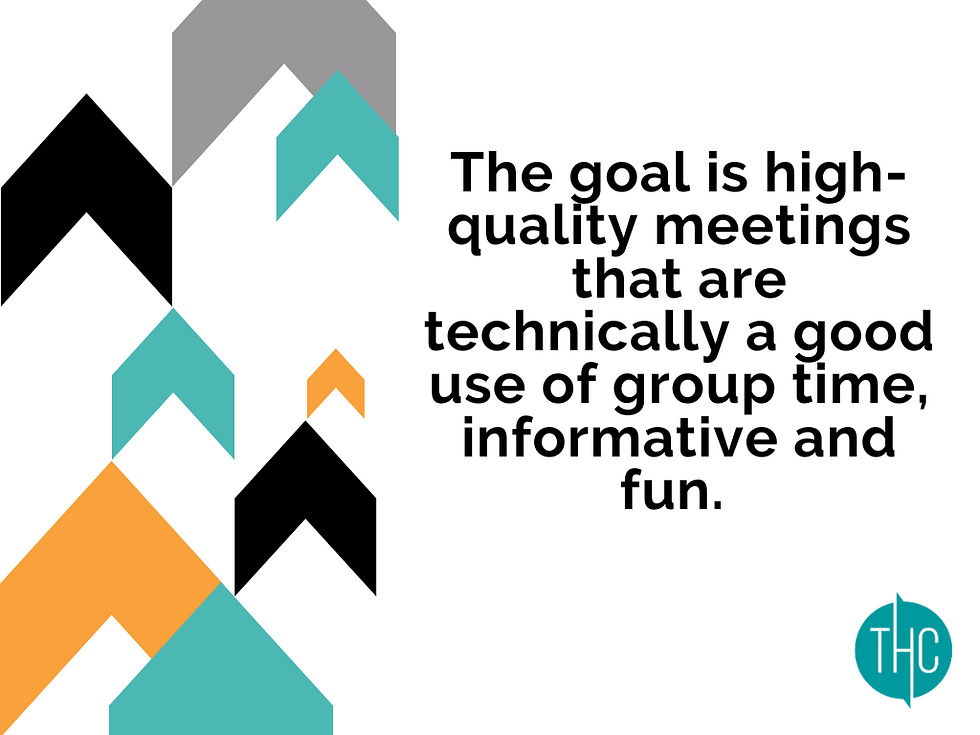How To Stop 'Over Meeting' in your Primary Care Network
- May 11, 2022
- 5 min read
Updated: Dec 20, 2022
In our blog titled 4 Top Tips To Help You Implement The Directed Enhanced Service (DES) in Your Primary Care Network, I emphasised the importance of relationships, and one key way to invest in this area with key PCN stakeholders in the early days is via meetings. HOWEVER, this needs a pragmatic approach and to use our time wisely.
I know you may be surprised to hear this, but many PCNs spend far too much time in meetings and not enough time delivering.
In this week's blog you will receive:
5 ideas to help reduce your time spent in meetings
7 top tips to help you facilitate a productive meeting
Let's get stuck in!

When we meet too much, we enter into too much talking and not enough doing territory.
A 2017 blog titled Stop the Meeting Madness, published in the Harvard Business Review, shared:
“We surveyed 182 senior managers in a range of industries: 65% said meetings keep them from completing their own work. 71% said meetings are unproductive and inefficient. 64% said meetings come at the expense of deep thinking. 62% said meetings miss opportunities to bring the team closer together”.
Asana (whom I have been a customer of since 2016) released their 2022 report titled An Anatomy of Work 2022, where they surveyed 10,624 global knowledge workers to learn what’s working—and what’s not—in their organisations. The results showed that in 2021, 129 hours were spent in unnecessary meetings. That’s just over five days, and to be honest, I think that figure is probably higher in the NHS.
The evidence is clear. Meeting too much is counterproductive.
Most primary care networks meetings will tend to include the following reoccurring meetings:
1. Monthly Board Meeting
2. Monthly practice managers' meeting
3. Weekly leadership meeting
4. Monthly staff 1-2-1’s
5. A monthly finance meeting
6. Monthly staff team meeting
7. If you are part of a federation, you may also attend a monthly meeting.
8. We also have the PCN wide, monthly Care Home MDT and weekly ward rounds.
9. Project/service steering group meetings
10. Protected Learning Time
With more work to deliver and more information to take on board, we need time to plan and produce, and we can’t do this if we are in meetings all of the time.
Time for an audit
1. Where can you replace a meeting with WhatsApp or Microsoft Teams communications?
2. What messages can be shared using written forms of communication? This may be in the form of a newsletter or TeamNet
3. Are you allowing enough time between meetings to deliver on the work?
4. Can you shorten any meetings by 15mins?
5. Can you reduce decision making by committee and empower and trust people to make decisions on behalf of the network?

Top tips to facilitate a productive meeting
Now that you have considered if you have to meet, here is my guide to facilitating a meeting which is technically a good use of group time, informative and fun.
1. Take Care of Your Basic Needs
Eat/drink, so you are focused
Ensure you are comfortable
Take a comfort break before your meeting starts
This seems obvious, but we are all so busy and can be rushing between tasks and meetings.
2. Creating your meeting outline
What is the purpose of your meeting?
Why do you want to meet, and who needs to be there?
What information can be shared outside of the meeting (how needed is the meeting and at what frequency?)
Who will be responsible for taking the actions?
Are you clear on your decision-making principles?
3. Create an Agenda
Decide the points that need to be discussed or shared in the meeting
Communicate the purpose and desired outcome of the meeting to ensure attendees know why they are there
Set a time frame and if you know that meetings can stray off course, set an expectation of time for each point on your agenda
4. Inviting Attendees/Stakeholders
Keep your meeting invite clear and succinct
Is it clear what you expect from your meeting stakeholders and how they can contribute?
Sometimes it can be helpful to speak to people ahead of the meeting to ensure you are ready to receive any curveballs that could derail your agenda or meeting purpose
Create a welcoming, positive and inclusive tone for your meeting so that people come prepared and comfortable to contribute
Send a reminder email the week before and a day before the meeting so that people know and are aware of when it's happening
5. Decision-Making Principles
Make sure everyone is prepared to back decisions made, even when they aren't their own
The role of the meeting chair is to hear all sides of the case and then drive forward that decision
Manage expectations. It's hard to please everyone, so you need to think carefully about how you will come to decisions as a team
6. Which Meeting Platforms to Use for Meetings?
Decide which platform you'll use to meet if meeting virtually or even part-virtually
What tech can you use to make the organisation of the meeting easier? We use Calendly and Doodle Poll
7. Accountability Don’t be scared to hold people accountable. If someone is allocated a task, they need to be held responsible for its completion with the agreement of why it’s needed, ensuring that it is aligned to a specific goal.
Listen to the podcast How to Create Effective Meetings.
Tools and tech

At THC, our go to communication tools are Microsoft Teams and WhatsApp to communicate with our PCN colleagues.
We tend to meet weekly as a team and then have conversations as and when. We also send voice notes. We know each well, and often a simple GIF says it all.
My NHS Confederation colleague Emma Ray swears by Trello whereas, we are fans of Asana. Both are platforms that help you manage your projects and tasks.
These tools buy back time and reduce the need for meetings.

If you found this blog useful, you may also like;
How to Negotiate Your Primary Care Network Services
The 2022/23 Network Contract Directed Enhanced Service Update
Sign up for our weekly newsletter for insights, PCN updates and the latest articles and content from THC Primary Care. Submit your email here!

Tara is a PCN Manager and MD at THC Primary Care with an MBA in Healthcare Leadership and Management.
Tara is published in the London Journal of Primary Care, is the author of over 200 blogs, and hosts The Business of Healthcare Podcast and has worked with 19 PCNs to date.
Find out more about THC Primary Care at www.thcprimarycare.co.uk.
And follow Tara on:
Twitter: @THCPrimarycare
LinkedIn: /tarahumphreythc
Instagram: @tarahumphreyy

We provide a range of services from Facilitation, PCN Management Training, Organisational and Team Development, and Interim PCN Management







.png)

.png)

